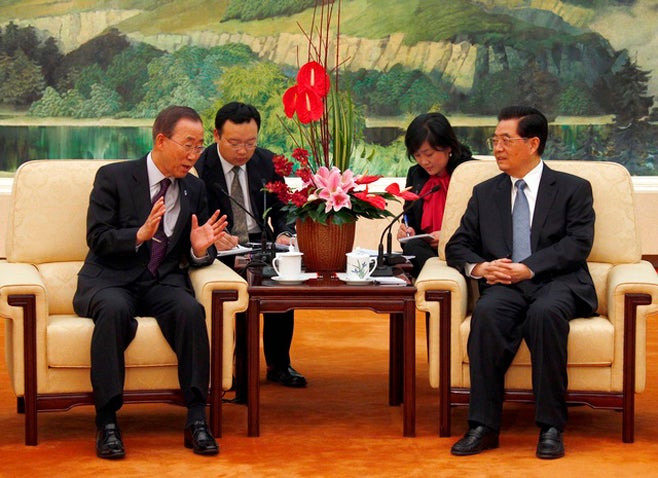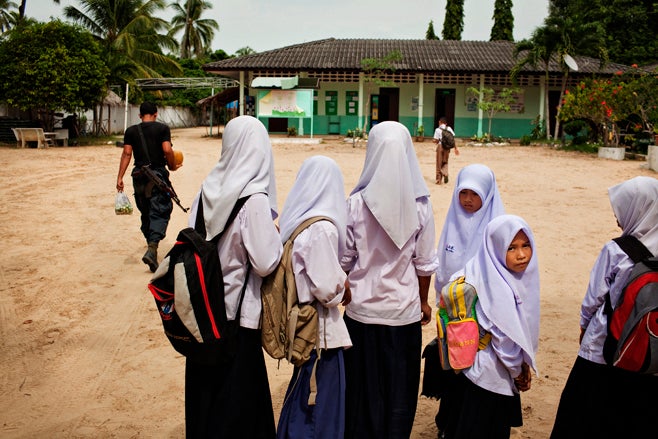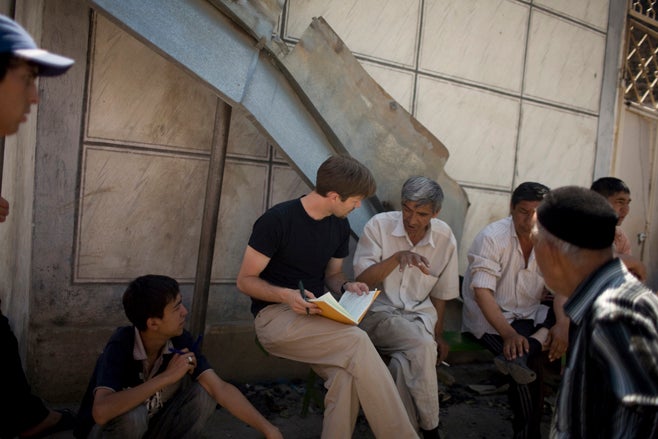The Venezuelan government's domination of the judiciary and its weakening of democratic checks and balances have contributed to a precarious human rights situation. Without judicial checks on its action, President Hugo Chávez's government has systematically undermined journalistic freedom of expression, workers' freedom of association, and the ability of human rights groups to promote human rights. It has also harassed political opponents.
Police abuses and impunity are a grave problem. Prison conditions are deplorable, and fatality rates high due to inmate violence.
Independence of the Judiciary
In 2004 President Chávez and his supporters in the National Assembly launched a political takeover of the Supreme Court, filling it with government supporters and creating new measures that make it possible to purge justices from the court. Since then the court has largely abdicated its role as a check on executive power, failing to uphold fundamental rights enshrined in Venezuela's constitution in key cases involving government efforts to limit freedom of expression and association.
The government shows scant respect for democratic checks and balances. Individual judges may face reprisals if they rule against government interests. In December 2009, Judge Maria Lourdes Afiuni was detained on the day she authorized the conditional release of Eligio Cedeño, a banker accused of corruption. Afiuni was following a recommendation by the UN working group on arbitrary detentions, given that Cedeño had been in pre-trial detention for almost three years despite, although Venezuelan law prescribes a two-year limit. A day after her arrest, Chávez branded Afiuni a "bandit" who should be sentenced to the maximum 30 years in prison. Accused of corruption, abuse of authority, and "favoring evasion of justice," the judge's right to due process was violated in several respects in criminal proceedings against her. Three UN human rights experts issued a joint press release describing her arrest as "a blow to the independence of judges and lawyers in the country," and called for her release. Still, the Supreme Court denied her appeals for the protection of her rights. As of October 2010 she was still held in deplorable conditions in a Caracas women's prison.
Media Freedom
Venezuela enjoys vibrant public debate in which anti-government and pro-government media are equally vocal in criticizing and defending the president. However, the government has discriminated against media that air views of political opponents, and has strengthened the state's capacity to limit free speech and created powerful incentives for government critics to self-censor. Laws contributing to a climate of self-censorship include amendments to the criminal code extending the scope of "desacato" laws that criminalize disrespect of high government officials, despite international standards that require such laws be abolished, and a broadcasting statute that allows arbitrary suspension of channels for the vaguely defined offense of "incitement."
In June 2010 journalist Francisco Pérez was sentenced to three years and nine months in prison, stripped of his professional certification, and ordered to pay a fine of almost US$20,000 for defaming Valencia's mayor. Perez had published two articles in El Carabobeno newspaper accusing the mayor of nepotism and corruption.
The government has abused its control of broadcasting frequencies to punish radio and television stations with overtly critical programming, while obliging private media to transmit speeches of the president and other officials. Since taking office in February 1999 Chávez has compelled radio and TV stations using public airwaves to transmit more than 2,000 of his speeches live.
In January 2010 the government broadcasting authority CONATEL ordered the country's cable providers to suspend transmitting channels that did not comply with the broadcasting statute-including the requirement to transmit presidential speeches-until they applied for, and received, the status of "international" channels (to which the statute does not apply). The suspension affected seven channels, including RCTV International, the cable channel created after RCTV-a critic of Chávez-was taken off public airwaves in 2007. CONATEL rejected RCTV International's application for status as a national broadcaster. At this writing the channel was only available online and unable to transmit in Venezuela.
In June 2010 Chávez created by decree a Center for Situational Studies of the Nation (CESNA), which has broad powers to limit public dissemination of "information, facts or circumstance[s]" that it decides should be confidential. The decree's language is so broad it could allow the government to block information disseminated by civil society groups and media entirely at its discretion.
Human Rights Defenders
The Chávez government has aggressively sought to discredit local and international human rights organizations. Officials, including the president, have repeatedly made unsubstantiated allegations that human rights advocates are engaged in efforts to destabilize the country.
Rights advocates have been targeted for prosecutorial harassment. In July 2010, President Chávez stated that prosecutors should "thoroughly investigate" the "millions and millions of dollars" that the US State department gives Venezuelan NGOs. His statements came a day after a pro-Chávez organization presented a formal complaint before prosecutors seeking an investigation into funding received by two leading human rights groups in Venezuela. The judiciary has offered no protection in such cases. The Supreme Court ruled the same month that "obtaining financial resources, either directly or indirectly, from foreign states with the intent of using them against the Republic, [and] the interest of the people [could constitute] treason."
Human rights defenders are often stigmatized in government-controlled media and harassed or intimidated by unidentified individuals aligned with the government. Carlos Correa, director of Public Space, was the subject of an aggressive publicity campaign in 2010, including an animated sequence aired by state television (VTV) depicting him leaving the US embassy in a limousine with a suitcase overflowing with US dollar bills.
Prosecution of Government Critics
Several prominent critics of the Chávez government have been targeted for criminal prosecution. The courts' lack of independence diminished the accused parties' chances of receiving a fair trial.
The Attorney General's Office opened an investigation into Guillermo Zuloaga, president of Globovisión, a television station critical of the Chávez government, for "disseminating false information, offense and insulting the President of the Republic." In a speech at a public meeting Zuloaga had accused the president of having "ordered the shooting" of demonstrators during the April 2002 coup against him. In June, the president voiced outrage in a televised speech that Zuloaga was still free. A week later, police arrived at Zuloaga's house to arrest him and his son for alleged irregularities in their car sales business, an investigation their lawyers said had been stalled for months. In August the Venezuelan Supreme Court authorized a request for Zuloaga and his son's extradition from the United States, where they had fled to escape arrest.
In May a prosecutor charged Oswaldo Álvarez Paz, a former governor of the state of Zulia and a Chávez opponent, with "public incitement [to violate laws] endangering public tranquility" and "publicizing false information" for criticizing the Chávez administration during a television interview in March. Álvarez Paz had said that, "Venezuela has turned into a center of operations that facilitates the business of drug trafficking." He was in pretrial detention for almost two months.
Police Abuses
Violent crime is rampant in Venezuela, where extrajudicial killings by security agents remain a recurring problem. The minister of the interior and justice has estimated that police commit one in every five crimes. According to the Attorney General's Office, law enforcement agents allegedly killed 7,998 people between January 2000 and the first third of 2009. Impunity for all violent crimes, including those committed by police, remains the norm.
In April 2008 the Chávez administration issued a decree establishing a new national police force, and enacting measures to promote non-abusive policing that were proposed by a commission made up of government and NGO representatives. In2010 agents of the new National Bolivarian Police (PNB), trained in human rights and non-abusive methods, participated in a pilot scheme in Catia, a high-crime district of Caracas. At this writing there had been no independent evaluation of the new police force's performance.
Prison Conditions
Venezuelan prisons are among the most violent in Latin America. Weak security, deteriorating infrastructure, overcrowding, insufficient and poorly trained guards, and corruption allow armed gangs to effectively control prisons. Hundreds of violent prison deaths occur every year. In September 2010 16 prisoners were killed and 35 wounded in a riot between rival armed gangs at the Aragua Penitenciary in Tocorón.
Labor Rights
The Chávez government has systematically violated workers' rights, undercutting established labor unions while favoring new, parallel unions that support its agenda.
The government requires the National Electoral Council (CNE), a public authority, to organize and certify all union elections, violating international standards that guarantee workers the right to elect their representatives in full freedom, according to conditions they determine. Established unions whose elections have not been CNE-certified are barred from participating in collective bargaining.
The government has for several years promised to reform the relevant labor and electoral laws to restrict state interference in union elections. Reforms that explicitly state that union elections held without CNE participation are legally valid were still pending before the National Assembly at this writing.
Key International Actors
Venezuela's government has increasingly rejected international monitoring of its human rights record. In its December 2009 report on human rights in Venezuela, the Inter-American Commission on Human Rights stated that by impeding it from visiting the country, Venezuela was "contributing to the weakening of the Inter-American system for the protection of human rights." Chávez described the report as "ineffable" and "ignominious."



